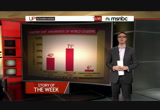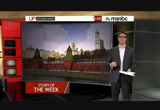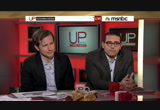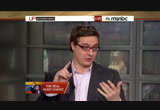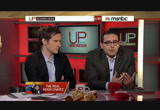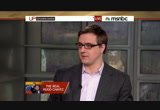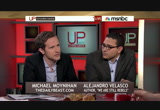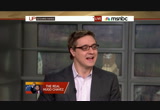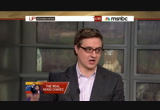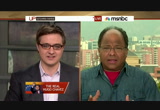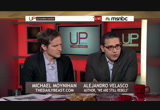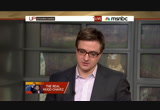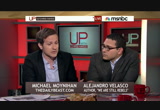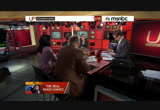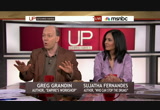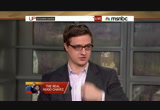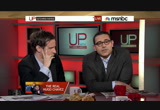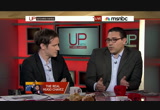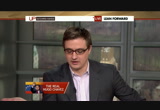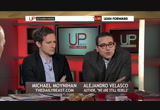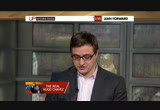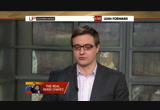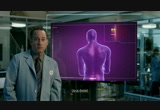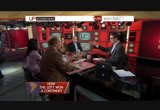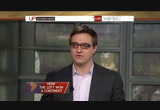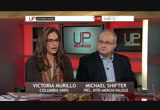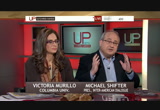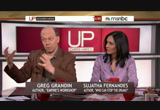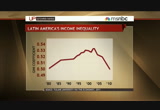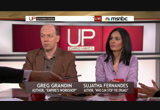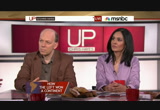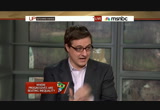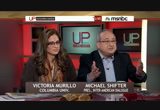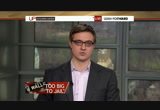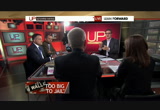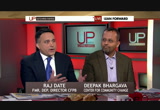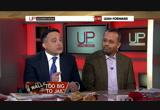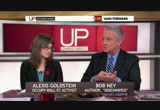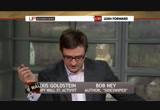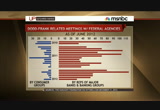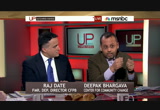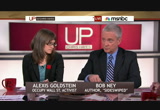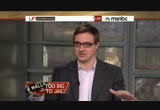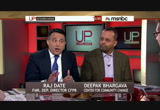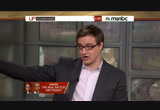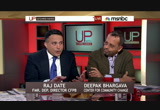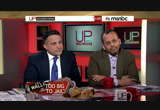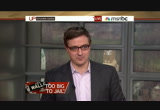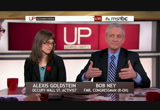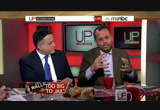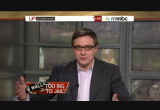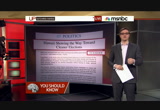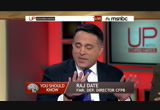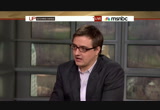tv Up W Chris Hayes MSNBC March 10, 2013 5:00am-7:00am PDT
5:00 am
openforum.com/yourbusiness. or e-mail your questions or comment. ever wish you had a host of people on call when you needed help with your small business? if so, you might to want check out our website of the week. clarity.fm lets you book time to talk to experts. can you find the best candidate to provide answers to all of your questions. experts verify their credentials use linkedin. to learn more about today's show, click on our website. it's openforum.com/your business. you'll find all of today's segments plus web exclusive content with more information to help your business grow. you can follow us on twitter. it's @msnbcyourbiz.
5:01 am
next week we go to the city of sin where one doctor is cruising the city with a miracle hangover item in hand. >> as soon as they walk on the bus we get their history, vital signs and moving through treatment. >> we'll take a look at how going to the customers is helping this business receive worldwide attention. remember, we make your business our business. when what you just bought, just broke. or when you have a little trouble a long way from home... as an american express cardmember you can expect some help. but what you might not expect, is you can get all this
5:02 am
with a prepaid card. spends like cash. feels like membership. good morning from new york. i'm chris hayes. venezuelan officials announced replacement for chavez is april 14th. president obama has reportedly decided to nominate assistant u.s. attorney general for civil rights thomas perez to be the next secretary of labor. i want to start with my story of the week beyond good and evil. on tuesday night we learned hugo chavez died it didn't start for the hyperbolic condemnations to start in. chavez was parroting cuba
5:03 am
caudilo human rights, the latest in the long line of caudilos, the scourge. my personal favorite was alex, arguing someone who took exception to his celebration of chavez's death by saying i have no respect for hitlers, do you? all of that instant condemnation made me wonder how we evaluate leaders from other countries and what it says about us of americans, winners of the natural lottery, that make us citizens much the world's lone super power. gap gallup asked people if they knew the name of the current russian president. over 70% new the leader was fidel castro but only 60% named the name of prime minister to our north, which was khretien.
5:04 am
if people know the name it's because he was cast as a villain in a national drama. what kind of knowledge is it to know simply and only someone somewhere is a bad guy? there are two different kinds of understanding one might have of a foreign leader or nation. one is a body of substantive knowledge about a country and its politics, institutionings that constrain its political life, history and culture and the strains of public opinion and national myth that shape what happens there. and then there's a determination about whether said leader is good or bad that resembles in its own strange way movie contradict's ultimate judgment, thumbs up or down. it occurred to me in the wake of chavez's death, we are -- most of us are critics who haven't even seen the movie. i couldn't tell you a whole lot about russian politics, honestly, how election works, how federalized the system is, basis of constitutional structure but i know put sn a reexpressive thug. i know very little about russia but i know whether i approve of
5:05 am
its leader. when you stop and think about it, that's a bit odd. i remember a few years back i spent a week in turk and talked to a wide range of people about prime minister, who is in turkey both a deeply polarizing and popular figure who led democratic nation for 11 years. a populist who many urbane liberal turks compared to george w. bush but also managed to establish primecy of the government over the turkish government that seemed transformative for a government that's witnessed three military coups. i remember thinking at some point i was failing because i wasn't able to come up with a simple judgment. where do i stand on him, thumbs up or down? i felt the same way after speaking a week in china where the complexities of the chinese state shatter every analysis of category going in. when people asked what i
5:06 am
thought, invariably, it's complicated fop say another country's leadership record is complicated. we shouldn't be neutral in the face of beatings and disappearances and state repression and bullying but condemnation and outrage are no substitute for knowledge about the world and other country's politic which is are tangled and complicated just like our own. i can't help but think there's a relationship between our tendency to know nothing about a country other than if they are bad or not and the fact we spend more on defense than the next 13 countries combined. if all we see are hitlers, we will forever be at war. so rather than render a final judgment on chavez's legacy i want to explore where he lies in the contested ground between villain and saint. joining me author of "we are still rebels."
5:07 am
a history and fernandez, author of "who can stop the drums" associate professor, associate at queens college and graduate center. so, where does chavez lie? i think the first question that i think a lot of people want to litigate, rightly so, is on this line between absolute authoritarian, totalitarian state with secret service and people in guchlt logs and i don't know our most shining example of democracy, scanned naif scan da naif va, don't know, but what should we call chavez, the political system he helped shape which was different upon his exit in terms of constitution, term limits, et cetera, number of houses in the legislature which were shrunk from two to one. what do we call that? how should we think about what
5:08 am
that is? >> i would say it's work in progress. as you mentioned, he takes power in 1999 after being swept into office after prior content with prior government, liberal, two-party democracy. oil refuse news were distributed even with a semblance of equality. he begins to implement a process he called participatory democracy. at the heart of it were two questions, who controls the oil industry and to what uses are the revenues of that industry going to go? in an oil country which venezuela is and sometimes we sort of don't have a sense of what this means but to internalize what a oil country is, those two questions shape the rest of the political environment. and what chavez did when he first came into office is to
5:09 am
say, well, the oil industry which at that time had gone through a process of reprivatization after the -- after the nationalization in 1776 should actually be -- should come back into the service of the venz venezuelan people. and he did that by strengthening opec. de that by forging renewed aligns with oe neck nation like iran, libya -- >> and he nationalized the oil. >> renationalized them. >> right, right. >> the other question is now that we have sort of renewed control of our industry, which created a tremendous battle internally, what do we do with those revenues now coming in? that's where you see the rise of social programs and a renewed consciousness about what should an oil industry do, which is basically to provide for it's citizens. >> you also see a centralization of power, right? obviously, oil is part of that. once you control oil revenue in a country that's entirely dependent or largely dependent on that oil revenue, you have
5:10 am
power, but also consolidation of -- he packed the court, expanded the number of people on the court, he under -- he passed laws that could give fines to opposition media. i mean, there were -- michael -- >> they very often, do, yeah. >> you wrote a quite critical piece. you're not a fan of him. i thought it was interesting, though. greg wrote a piece that was, i think, quite lauditory. you wrote a piece critical but you both have paragraphs -- you say he was a strong man and you say he was a dictator but no democrat. >> sure. words mean things. show people up on the front saying he's a dictator, like hitler. no, he's not. good god. can you go to venezuela, be in the opposition, see these newspapers, that said, it is a very tough business. all you need to do is look at human rights launch, the
5:11 am
community to protect journalists, amnesty. it's not right-wing organizations saying, oh, we despise socialism and redistribution of wealth regardless of what he's doing with the bright way of redistributing wealth, that's fine. but whether or not this has produced an authoritarian country. when i was in venezuela in march with people, cameramen who had never been down there, i was in a newspaper and chavez was on tv, something no supporter would ever allow in united states. it's when the government requires all radio and television stations to carry a message from the president which can land up to eight hours. that existed prior to chavez but mostly for emergencies and stuff. journalists started flipping the channels and every one was chav chavez. the field saying -- this is a very bizarre thing for people in the united states.
5:12 am
in that type of thing, no, the ballot boxes aren't stuffed. you can verify these elections for sure. but prior to the election is when you say, this isn't exactly a western democracy when air waves are dominated -- >> just to go back to the question of media, what people think happens or what actually happens on the grounds. the fact is the state controls about 5% of radio and tv stations. 70% is in the hands of private hands. maybe 25% is in the hands of these community stations that have sprouted up. ratings skew towards private or cable. cable actually -- the cable stations don't have to, especially if they broadcast, fox and -- >> poor communities. that zoo that said, going back to the question of how do we explain this, it's complicated, how do we think of that complexity, one way is think historically. what you have in venezuela is complete collapse of the two-party system.
5:13 am
an exclusive system. it was founded on corruption and exclusion and didn't -- didn't incorporate the interests or participation or meet the basic needs of the majority of population particularly during the last ten decades of that system, which completely implodes in 1998. chavez emerges representing a broad coalition. it could have taken different shapes at different times. it was not focused. and because he fairly quickly established rhetorical agemini, and then electricer to agemmy, he won four elections, five in-f you count the recall. but because it was re-elected he didn't confront the kind of pockets of -- oil money allowed
5:14 am
him to play a broker. this is venezuela exceptionally. other countries that had this kind of breakdown -- >> don't have oil revenue, right. >> would a rising political coalition would have been forced to choose between the old political clashgs the new social movements, the military. chavez because of his skills didn't have to. setting aside his own personal motivations of whether he was a good or bad person, venezuela might be the most democratic country in the hemisphere because of the social movements that support him, which he never repressed. there's something. aproximate mating -- >> why would you repress -- the test -- a test of how democratic a country isn't whether the leader represses the social movements that repress him -- >> that's what i'm saying. i mean, there's a history in these left-wing military
5:15 am
populist. chavez is the only one who didn't turn, a couple of years. >> i see what you're saying. >> so if he had created -- if he had presided over over a consolidating state we would have had the prix in mexico -- >> you talk about rhetoric and i want to stalk about the aesthetics of this. that's the least important part but from the perspective of how i look at, it that's the thing that sceeves me out the most. are all the aesthetics of what looks like a dictator, he's not, but the eight-hour speeches, the kind of cult of personalities that he's grown up around, the fact he's going to be embalmed and put on display. a trimmer? no. we got nothing. we just got our first house, we're on a budget. we're not ready for spring. well let's get you ready. very nice. you see these various colors. we got workshops every saturday. maybe a little bit over here. this spring, take on more lawn for less.
5:16 am
not bad for our first spring. more saving. more doing. that's the power of the home depot. get ready for spring with this ryobi 18-volt trimmer, just ninety-nine bucks. from capital one... boris earns unlimited rewards for his small business. can i get the smith contract, please? thank you. that's three new paper shredders. [ boris ] put 'em on my spark card. [ garth ] boris' small business earns 2% cash back on every purchase every day. great businesses deserve unlimited rewards. read back the chicken's testimony, please. "buk, buk, bukka!" [ male announcer ] get the spark business card from capital one and earn unlimited rewards. choose 2% cash back or double miles on every purchase every day. told you i'd get half. what's in your wallet? with olay, here's how.
5:17 am
new regenerist eye and lash duo. the cream smooths the look of lids... softens the look of lines. the serum instantly thickens the look of lashes. see wow! eyes in just one week with olay. it's delicious. so now we've turned her toffee into a business. my goal was to take an idea and make it happen. i'm janet long and i formed my toffee company through legalzoom. i never really thought i would make money doing what i love. [ robert ] we created legalzoom to help people start their business and launch their dreams. go to legalzoom.com today and make your business dream a reality. at legalzoom.com we put the law on your side.
5:19 am
prominence as leader of a failed coup in 1992 1k3 he's allowed to address the nation as a kind of bargaining that doesn't go forward. we'll call this off but you get to say your peace. and he addresses the nation in a moment that would make him famous and sort of announce him to venezuelans. take a look. >> incredibly brassy move to be busted about to do a coup to say our state of objectives we're not achieved in the capital city when you're about to be put in prison. this is the beginning of this -- of him as this figure in venezuelan politics. >> i think what you're saying about the culture -- what you were saying about the culture of his long speeches, the mass rallies, the big placards,
5:20 am
there's very much a cult of this figure of hugo chavez. and i think that this goes along with this concentration of the power in the fug of the executive, which is something else. he really did expand the power of that particular office, more than had existed previously. i think what makes the presidency of hugo chavez sort of interesting and conflicting in a way is that at the same time he did this, he was using these mechanisms electoral democracy. he stood at a recall referendum. he reformed the constitution. sought to bring about that change in the constitution. and so there were all of these ways which through the electoral sphere he was seeking to bring about change. >> he was also doing things like -- allied judges were striking leaders off candidate lists. you know, there was a degree to which the deck was a bit stacked in those elections opponents argue, right? >> i'm not going to defend those things he did. i'm going to say that at the
5:21 am
same time he was doing those things, he was also opening spaces at the grassroots. and i think what greg had said earlier about social movements, and it's not just that it was social movements that suspected him. it was a heterogeneous range of movements that went from vast 200 to 300 community radio stations that sprung up, roots that go back to the 1970s and not all i've had as chavez supporters. >> i'll go to a member of chavez united socialist party joining us live from caracas. thank you for joining us. i think the question is can -- >> good morning. >> can chavismo and what people are talking about outlive chavez. >> yes? >> i think we lost him, actually. do we have him?
5:22 am
all right. are you there with us? >> i'm here. >> i'm sorry. the question is whether chavismo can outlive chavez. >> it went out. >> we have a technical question so i'll throw it out to you. whether the institutions that have been built are strong enough to have something beyond the cult of personality when that personality is now no longer. >> this gets back to your original question, was he a democrat, where does he lie within that line. i think the standards of what we understand by liberal democracy, we might say for all the reasons you've mentioned, that that record is suspect. on the other hand, i think what was at stake in venezuela was a definition of what democracy can or should be. in this context the social movements that sprung up and also that had existed as sujatha
5:23 am
mentioned before, when you talk to folks in those movements, those are the ones with the sharpest criticism of the government. actually, you find in those movements. people who talk about corruption at the state level. people talk about inefficiencies in terms of social programs, people who talk about the need to go beyond the -- sort of the figure of the leader, et cetera, et cetera. but they also had a very similar botic relationship with chavez, those who came before and represented the opposition they had an opportunity to experiment with local governance and movements. >> the thing that facilitated this -- when you read accounts of chavez, i was saying this before on the air, even neutral accounts, when you read even supposed neutral little, therac fact he used revenue of oil for
5:24 am
those that supported education and health care, like that was cheating. his popularity was somehow not on the up and up because part of it was just the basic function of redistributing oil revenue to the poor. that strikings me as what a government should do. >> as norwegians and do -- >> and alaskans. >> sovereign wealth funds and so on. incidentally, everyone goes on about chavez here. no one is looking at socialism -- there's something special about this. it is that bluster, it is that anti-americanism or is it? i would say this about the oil. the economists had an interesting chart and something i noticed and economists pointed out for the past four or five years is this isn't a sustainable model for venezuela. that's the problem. oil revenue should trickle down to the people in slums or that
5:25 am
aren't wealthy. the interesting thing is when chavez came to power, oil was $10 a barrel. in 2008 it came up to $140 a barrel. i mean, where is the parallel economy outside of oil. well, there really isn't one. venezuela even imports oil sometimes, too. >> and also has -- >> production has dropped off significantly. et cetera, et cetera. >> i want to pivot to economic management because there's a whole bunch of economic ills, which plague every country. there's inflation and high budget deficit which is particularly high, and an economy that isn't reliant on oil. i want to talk about economic management after chavez. humans. even when we cross our t's and dot our i's,
5:26 am
we still run into problems. namely, other humans. which is why at liberty mutual insurance, auto policies come with new car replacement and accident forgiveness if you qualify. see what else comes standard at libertymutual.com. liberty mutual insurance. responsibility. what's your policy? accomplishing even little things can become major victories. i'm phil mickelson, pro golfer.
5:27 am
when i was diagnosed with psoriatic arthritis, my rheumatologist prescribed enbrel for my pain and stiffness, and to help stop joint damage. [ male announcer ] enbrel may lower your ability to fight infections. serious, sometimes fatal events including infections, tuberculosis, lymphoma, other cancers, nervous system and blood disorders, and allergic reactions have occurred. before starting enbrel, your doctor should test you for tuberculosis and discuss whether you've been to a region where certain fungal infections are common. you should not start enbrel if you have an infection like the flu. tell your doctor if you're prone to infections, have cuts or sores, have had hepatitis b, have been treated for heart failure, or if you have symptoms such as persistent fever, bruising, bleeding, or paleness. since enbrel helped relieve my joint pain, it's the little things that mean the most. ask your rheumatologist if enbrel is right for you. [ doctor ] enbrel, the number one biologic medicine prescribed by rheumatologists. [ girl ]rumental ]rel, when i started playing soccer,ne i wasn't so good.
5:28 am
[ barks ] so me and sadie started practicing. we practiced a lot. now i've got some moves! [ crowd cheering ] spin kick! whoo-hoo! [ giggling ] [ announcer ] we know how important your dog is to your whole family. so help keep him strong and healthy... with the total care nutrition in purina dog chow. because you're not just a family. you're a dog family. try running four.ning a restaurant is hard, fortunately we've got ink. it gives us 5x the rewards on our internet, phone charges and cable, plus at office supply stores. rewards we put right back into our business. this is the only thing we've ever wanted to do and ink helps us do it. make your mark with ink from chase. economic management of
5:29 am
chavez in venezuela, a country dependent on oil revenue, but there are a lot of -- credit ibs will say and i think even left critics, those looking at it not from an ideological opposition to what chavez was doing but even grounded in the left, look at the economic management and look at the inflation numbers, the massive crime explosion that's happened in caracas to the point where they stopped publishing figure and the budget deficit and real dependence on oil and lack of a kind of -- any sort of export sector and look at that and say, this was not -- this was a failed experiment from economic management. >> obviously, this problem, every country has problems economically. in terms of crime, you look at sao paulo, not as high as caracas -- >> but in caracas they went up.
5:30 am
part of it has to do with this incredibly mismatch of structure of police where there's five or six police divisions within the city of caracas with five different mayors fighting each other. it's not chavez oning it. that's one thing. going back to the economics. there's some inflation. inflation is running at 22%. it was 30% in the decades before chavez on average. inflation in itself isn't a problem if salaries keep up with it. that pumping an enormous amount of money into the economy and raising salaries to some degree. i mean, look, they weathered the 2008. there was downtick, 13 quarters of uptick. i'm not saying it's great but people say venezuela is the most lied about country. the sky's been falling in terms of economics for 14 years. the other thing -- >> let me just say 22% inflation is -- i mean, i understand this is in the context of a country that has -- that is dependent on
5:31 am
oil revenue and a continent that has seen high inflation throughout the years, and much of the neoliberal program put in place in the 1990s that was about the big thing they went after. 22% inflation is that, 22% inflation. >> but we -- >> lost 20% of its value this month. look, this -- and you rename it after this happens in a great orwellian touch to name it the strong forte as shedding value. >> that's a devaluation, one of the things they're trying to do is lower the value in order to cultivate and nurture domestic industry. there's problems. being dependent -- >> the interesting thing is the currency was overvalued, right? that was part of the problem. >> yeah, absolutely. being dependent on oil is a problem. but it's not a problem, particularly to chavez, i don't think the sky -- i mean, michael said it wasn't sustainable. i don't understand why it's not sustainable. they have 500 billion barrels of
5:32 am
oil, 300 billion proven -- >> we'll burn the planet if we take all of that out of the ground. it's not sustainable for that reason. >> wind farms, come on. >> i would come back to, his economic management was ratified in a series of elections. venezuelans themselves think -- well, they choose, right? all polls, the earth institute at columbia -- >> george w. bush's foreign policy was ratified in an election and i dissent from that ratification. >> all i'm saying is -- going back to the frame beyond good and evil, it's this -- >> no, no, i'm just saying -- here's one thing. one is, the record of economic management, right, and then the broader question is, what's the trajectory of it? there's a sense that embues the sense of chavez about this disillusion in the -- right? there was something that was working. and that in the last three or
5:33 am
four years there's been disillusion, which is seen in crime and inflation. the trajectory of the country and the country of economic stewardship is not upward but down. >> i was kind of thinking that before the last election. i was kind of, oh, things have gone really wrong. basically it's because i stopped paying attention for a while. i was actually blown away by the election. i was actually surprised. >> he was re-elected in 2012 with 55% of the vote. >> by the way, this is narrowing and narrowing. >> let me say this, 45% of the vote against him is another mark in the not a dictator, right? no dictator doesn't let 45% -- >> it's not kurdistan. >> not thhussein's 100%. >> its primary domestic campaign was to deepen the social programs. was to -- the critique was the
5:34 am
problem with the social missions isn't the missions. the problem is they're run inefficiently. i come back to the point i made before. even within the social movements, they understood the efficiencies and so they were trying to come up with a new program, social actability to are much more tighter level how those resources were being redistributed. in terms of the up with yard trajectory or the narrowing of the gap, we don't really have a good good measure of what the electoral ceiling is. the last electoral contest they ran in 2006 they had done so with a divided opposition that didn't trust the electoral council at that point. so, the huge margin he saw in 2006 was in part because we -- they didn't really -- the sector of the opposition didn't really trust them. >> let me show to give benchmarks in terms of gdp per capita from 2003 to 2011,
5:35 am
brazil, 5% increase. brazil has its own stuff with soy and ethanol. poverty level, this is fascinating and this is the signature of economic accomplishment which is the poverty level in venezuela goes from 62% to 32%, which is 30 percentage point drop. >> that's gdp, not including the massive social spending. doesn't include health care. that's just gd. p it's amazing. >> please. >> no. >> i want to turn to the role chavez played in the world. part of the reason americans know chavez is because he was one of the most valuable and invisible critics of the bush presidency. and also just played this on the world stage. kate and i have been married for 15 years.
5:36 am
that's 3 moves, 5 jobs, 2 newborns. it's no wonder i'm getting gray. but kate -- still looks like...kate. with nice'n easy, all they see is you -- in one simple step, nice'n easy with colorblend technology, gives expert highlights and lowlights. for color that's perfectly true to you. i don't know all her secrets, but i do know kate's more beautiful now, than the day i married her. with the expert highlights and lowlights of nice 'n easy, all they see is you. okay why? more is better than less because if stuff is not le-- if there is more less stuff then you might want to have some more and your parents just don't let you because there's only a little bit. right. we want more, we want more. like you really like it, you want more. right. i follow you. [ male announcer ] it's not complicated. more is better. and at&t has the nation's largest 4g network.
5:38 am
i have a great fit with my dentures. i love kiwis. i've always had that issue with the seeds getting under my denture. super poligrip free -- it creates a seal of the dentures in my mouth. even well-fitting dentures let in food particles. super poligrip is zinc free. with just a few dabs, it's clinically proven to seal out more food particles so you're more comfortable and confident while you eat. super poligrip free made the kiwi an enjoyable experience.
5:39 am
[ charlie ] try zinc free super poligrip. for the years of the last decade hugo chavez was one of the most visible foils to george w. bush, here's a little montage of chavez taking shots at george w. bush. >> translator: yesterday the devil came here. right here. right here. and it smells of sulfur still today. the president of the united states, the gentleman to whom i refer to as the devil, came here.
5:40 am
>> translator: you are a donkey, you are a donkey george w. bush. you are a donkey, mr. bush. >> that's -- what is the reference to mr. danger? >> well, chavez dropped that reference after while but comes from a 1940-something novel, i forgot his name, ramos galligoes, he was a blue-eyed texan who sat around and shot alligators. it's a historical reference. he wasn't calling bush mr. danger out of nowhere. >> there's this counter agemini that chavez said he was building, very close to fidel castro, and more problematically from where -- close to ahmadinejad, pictures of him
5:41 am
holding the hand of gadhafi, he was had relationship with those in the arab spring, and it also seems like what -- does anything outlive chavez in terms to creating counterhagemini. >> the prime minister of brazil had an astonishing op-ed who said one of the major legacies of chavez was precisely to give impetus to give those known as the good left in the region. in terms of the relationship with these unsavory characters, and it's not just real politic, it's actual interest. the thing they have in common is they are all part of opec, right? and so, you know, in terms of this broader project of trying to give new teeth to opec,
5:42 am
especially after the 1990s period of low oil prices, a lot of violations, et cetera, et cetera, this was a part of that policy. >> and also in terms of interest, right? the oil venezuela sold to the u.s. never stopped, right? no matter what he said -- >> stopped one time and stopped during the oil strike. >> right, right. but under chavez. >> i mean, this is where america's funding chavez's revolution. >> there's symiosis there, too. >> it's amuzing to watch those clips and less amusing, as you say. praise of people, not even opec people, robert magabi. there was a picture of his casket flanked by one of the most horrifying dictators of belarus. >> genuine. >> and ahmadinejad on the other side. these are obviously not just ordinary, unsavory characters.
5:43 am
i mean, giving oil and providing oil to syria, to fund -- >> and defending assad, right? >> i mean, this is problematic. i don't know how one can defend this. the relationship between latin american countries and cuba, okay, i don't accept in any way. we'll see what happens. if cuba would have atrophied even more had it not been supplied with venezuelan oil -- >> let me say this, though. there was some bee lidge republicans at some point with colombia. but there were no wars, right? >> did he not fund farc when it suited him or -- sometimes he would kick people out. >> when st. peter's up there and you meet him and he has the ledger out about your foreign policy, the first thing to me is, how many wars did you start? which is not to excuse, oh, well, he didn't start wars and
5:44 am
it's okay -- >> and it's okay to fund the war in syria. it's not a war -- >> i don't feel like i have to defend -- i mean, have i no -- no interest in defending any of these relationships. it is true latin america has struggled to have its own foreign policy in the shadow of the united states. this is a region that had 41 -- the u.s. changed governments in latin america between 19 1889 and 1948, 40 times. it goes back. ayendy was close with gadhafi. >> an amazinging thing happened, this period of benign neglect happened with u.s. policy toward latin america and either coincidentally or causally, a real transformation happened in the continent's politics which i want to look at that which is one of the most remarkable stories in the globe in the last 10 or 15 years. we don't talk about -- precisely because our attention has been
5:45 am
on our country. thank you for joining us this morning. >> thank you. what we can learn from latin america's shift to the left next. ♪ right. but the most important feature of all is... the capital one purchase eraser. i can redeem the double miles i earned with my venture card to erase recent travel purchases. and with a few clicks, this mission never happened. uh, what's this button do? [ electricity zaps ] ♪ you requested backup? yes. yes i did. what's in your wallet? are proven to be effective pain relievers. tylenol works by blocking pain signals to your brain. bayer advanced aspirin blocks pain at the site. try the power of bayer advanced aspirin.
5:47 am
it's delicious. so now we've turned her toffee into a business. my goal was to take an idea and make it happen. i'm janet long and i formed my toffee company through legalzoom. i never really thought i would make money doing what i love. [ robert ] we created legalzoom to help people start their business and launch their dreams. go to legalzoom.com today and make your business dream a reality. at legalzoom.com we put the law on your side. even the inside of your dishwasher sparkles. okay. so i'm the bad guy for being clean. you said it. ladies, let's not fight dirty. cascade kitchen counselor. see, over time, a competing gel can leave hard-water film on your dishes. new cascade platinum's triple-action formula not only cleans your dishes, it helps keep your dishwasher sparkling.
5:48 am
so we're good? don't do that. okay. [ female announcer ] cascade's best is new cascade platinum. hugo chavez was one of the most well known leaders in latin america in the last decade and a half but he was just part of a much broader trend that happened there in a transformation of the continent continent's. politics. joining us is maria, professor of political science and school of international public affairs at columbia university. michael shifter, president of shifter north america. what happened in latin america is remarkable. chavez gets all the attention in the u.s. because he goes on, you know, tv and says, mr. bush, you're a donkey, but there was across the continent an election of a series of leaders from left of center parties, left
5:49 am
coalitions. de silva in brazil, kirchner and his wife, and morales in bolivia. i said, if he can get elected in bolivia, really -- the boot strap story is not exclusively america's. correa was in the news lately, and vazquez. there was a remarkable transformation. how do we think about what happened in latin america in the last decade? it's rare to see a continent move. in europe it's not the case that, oh, all the central left parties win over some period of time. the germans might elect some
5:50 am
christian democrats, italians might have a conservative. in latin america there seemed to be a mass trajectory of the voting population, and i wonder how you accept that? >> there are exceptions but it coincides with a region long standing of equality so demand for redistribution has existed for a long period. >> explain what adjustment means because that has a specific meaning. what do you mean by adjustment in. >> latin america of the 1990s was current europe, i guess. you remember there was a debt crisis in 1982, all these governments suffered very strong fiscal crisises. they demanded to repay their debt, similar to what we're seeing in greece these days. a lot of these governments, regardless of-f elected in the left and right, adopted policies that were restricting
5:51 am
expenditures -- >> austerity. >> austerity parties that were very hard on the population. so, we see increasing inequality in a region that traditionally had very high levels of inequality. >> the backlash in liberalism and imf program called structural adjustment at the time which imf said, we will write down your debt, forgive your debt, write down your debt if you dot following, which is balance budgets, cut social services, et cetera. is that your understanding of this sort of reaction in liberalism and what happened in the couldnntinent in the last decade? >> i think that set of prescriptions, some of them have been implemented successfully in latin america but they forgot about the social equity question, which is a crucial component. that was picked up in latin america. the emphasis on social agenda is something that's characterized the last decade. you can't understand the last decade. it actually started in 2003, the tremendous growth in latin america. this has been a very, very good decade for latin america. high growth rates, reduction in
5:52 am
poverty. not only in poverty, in equality. the achilles of latin america, in a number of countries. this has been a very good decade and distancing from the united states. that's the other -- >> i want to talk about how much that played and this idea of chavez representing two different models of latin america future. r. but that doesn't mean i don't want to make money. i love making money. i try to be smart with my investments. i also try to keep my costs down. what's your plan? ishares. low cost and tax efficient. find out why nine out of ten large professional investors choose ishares for their etfs. ishares by blackrock. call 1-800-ishares for a prospectus which includes investment objectives, risks, charges and expenses. read and consider it carefully before investing. risk includes possible loss of principal.
5:53 am
a talking car. but i'll tell you what impresses me. a talking train. this ge locomotive can tell you exactly where it is, what it's carrying, while using less fuel. delivering whatever the world needs, when it needs it. ♪ after all, what's the point of talking if you don't have something important to say? ♪
5:55 am
back to monroe doctrine, the u.s. has had this very involved foreign policy in latin america. you made a point about the number of governments we aided in being changed, to a say it as you've mystically as possible. i wonder how much the u.s., pivoting its attention away from latin america after the attacks of 9/11 is part of the story of this kind of flourishing of the left politics on the continent. >> i think it's also part of the story for a long time democracy, regardless of the sign of democracy. i think the fact the u.s. pays attention to other regions al w
5:56 am
allowed the region to flourish on its own terms. can you see that in 1992 against chavez. the u.s. position was very clear but all the governments of the region, whether on the right or left, stand up against the coup. so, i think the region, because the u.s. is not paying attention has generally moved in a positive direction with democracy. >> michael? >> the other thing that's crucial is economic crisis used to start in latin america. the 2008 crisis originated in the united states. >> right. >> latin americans have accused the united states of meddling, interventionism, being heavy-handed but they thought they could manage their fiscal and economic -- >> right. >> so 2008 was a critical turning point not only because latin america weathered the crisis very well. all the predictions -- >> and the trash talking about -- >> the blue-eyed -- >> right, right. >> all of that stuff. the predictions said latin american would be effectaffecte
5:57 am
u.s. crisis. much less than expected. that was a critical turning point. >> can i add in, it's seen like leaders like morales, cha vesz, are coming out of nowhere and taking the stage. i want to highlight there's a trajectory from the debt protests, protesting these austerity policies to formations of larger movements and coalitions that build so much power through ousting governments and building, larger alliances that they're a very important part of this story of how leaders come into power. >> because there was such organization and activism against these policies that really were brutal on people. >> are yes, right. >> we should be clear. i mean, the levels of austerity that happened in latin america in the 1990s were really, really, really profound. >> to understand turning to the left, the statistics you need to know between 1960 and 1980 the heyday of growth rate is like 70% per capita across the region. not great, singapore, but substantial, created a middle class. between 1980 and 2000 the heyday
5:58 am
of austerity and liberalism, reaganism on steroids, 7% per capita. add to that the serial -- building volatility into the system. so 2008 in mexico, 2002 in argentina and what emerged are social movements that turned latin america into the vanguard of the socialization movement. >> another thing we've seen is inequality reduced, right? you made this point. that's partly because commodity prices have gone up but partly because there was an egalitarian agenda of those aelectricitied. lula, chavez, kirschner. you see what happens is income inequality rises during that period you're talking about austerity, right, from really, really rises, and then it declines quite significantly. that bell curve there is -- it tells you a lot about what you
5:59 am
need to know. i want to talk about lula, who i find to be one of the most fascinating figures in the world and different models of latin america. [ snoring ] ♪ [ snoring ] [ male announcer ] zzzquil™ sleep-aid. [ snoring ] [ snoring ] [ male announcer ] it's not for colds. it's not for pain. it's just for sleep. [ snoring ] [ male announcer ] because sleep is a beautiful thing™. [ birds chirping ] zzzquil™. the non-habit forming sleep-aid from the makers of nyquil®. ♪ a hairline fracture to the mandible and contusions to the metacarpus. what do you see? um, i see a duck. be more specific. i see the aflac duck. i see the aflac duck out of work and not making any money. i see him moving in with his parents and selling bootleg dvds out of the back of a van. dude, that's your life. remember, aflac will give him cash to help cover his rent, car payments and keep everything as normal as possible. i see lunch. [ monitor beeping ]
6:00 am
6:01 am
[ male announcer ] want to make a great car interior? stop looking at car interiors. get inspired by other stuff. yep. yep. ok. sure. why not? woah. touchscreens. put that in your dash. now, luxury stuff. make your seats like that. that thing has wifi, why doesn't your car? you can't do that. ignore that guy. give it wifi. yes! make it fit 5 people. no, 5 actual sized people. give them leg room, good.
6:02 am
destroy boring car interiors forever. and that's how you do it. easy. ♪ from new york, i'm chris hayes with greg grandin, victoria murillo. we were talking about the remarkable transformation that's happened in latin america in the last 10 to 15 years. there's this thesis about sort of dividing the kind of left movements that have happened in latin america. roughly into the kind of chavez camp and the lula camp. and, you know, it's an
6:03 am
oversimplification but there are some lines like nationalization and price controls which you saw in chavez's venezuela, you've seen a little in arrange tina under the kirchn. r, especially recently versus private markets and high levels of taxation redistribution that you've seen in lula's brazil. and the brazil model has been very successful. extremely successful. again, that's partly because of commodity prices have gone up. they export a lot of ethanol, they export a lot of soy. but i wonder what your sense is of that as a way of thinking about the -- about what's happened in latin america? >> well, i think, you know, there is less of a lula model than a brazil or a -- you know, certain countries that have more restrictions. lula decided -- if you remember when he elected there was panic so he had to sign that he would be moderate so that brazil would not suffer economically.
6:04 am
brazil had a lot of foreign investment. still continues to have. but countries like chile that used to become left wing, that's not any more, probably would have again, uruguay and brazil are countries where there's moderation in discourse. tremendous distribution is really associated to the fact they have a political system where they have opposition from the right where voters cannot be moved in the same way as in the other countries. and there has been no kind of collapse of the party systems the other more radical countries -- >> what's interesting to me, redistribution as one learns from watching american politics is hard, right? it's rolling a rock up a hill. because the people who make a lot of money don't want to be taxed. you know, rationally. >> if you have a commodity, it's very easy not to tax -- if you tax soy in the port f you tax oil that your own company produces, this is not income tax we're talking about. all this redistribution is
6:05 am
coming from commodity taxes. >> that's right. >> going back to the distinction between lula and chavez, they both came out of very different contexts, right? chavez came out of a context of complete collapse and he basically was presiding over the reformation. lula was elected in a very complex, established political system. that to a large degree, the left, the ptl built after the -- >> the workers party. >>y yes. after the dictatorership. so there was much -- in chavez was in brazil, would he be lula? that's the question. to the degree they tried to divide them, this is something being peddled by washington and washington think tanks. just read lula's op-ed the other day in the "new york times" where he makes it clear that he called him a cherished partner. he understood they is had the same goals and worked to build this alternative political structure. >> i suspect you do see a distinction between them? >> talking about washington think tanks. >> right. >> no, i mean, i think lula's article didn't surprise me. clearly there's great solidar y
6:06 am
solidarity, affinity, all of that expected. if you look at brazil and venezuela, they're two very different models. there's a give and take. take one country, peru. peru is a country that hasn't had a leftist government at all. if you look at gdp, poverty gone down. big commodity producers. >> colombia as well. >> under santos, not a man of the left. >> no. >> and the current president of peru backed -- was identified with chavez in 2006, lost. then he came back in 2011 had advisers from lula, who were helping him change to a much more moderate, pragmatic position, won the election of 2011 and his economic policies is like the envy of milton friedman today. he's very, very orthodox, conventional, fiscal discipline and the like. so, there are some stories out there that i think are very instructive about what's an
6:07 am
appealing model more broadly. >> but that's -- this point is very interesting, right? if inequality is going down in countries both with left and right governments, that's a fascinating thing, right? that doesn't happen very often. i mean, what is the story -- i guess my question is, is that just -- i guess we're talking around the same thing. natural resources, is that really the story here? i look at politics and i find the politics of lula's brazil, which are complicated and there's corruption scandals and a million things. but they're encouraging in the sense of, you know, there's this model in which a left party runs expless italy on egalitarian agenda. they get elected into office and they make the country more equal. in a country right now that has huge levels of high and accelerating inequality, that has elected a left of center party in barack obama but has seen inequality continue to rise, in some ways get worse after the recession, my question is, what can we learn, what is the takeaway? maybe the answer is, it's just
6:08 am
too -- >> the lessons are not so easy because inequality to begin with in all of latin american countries is much higher than the u.s. inequality post-taxes was also much higher than the u.s. because income taxes do not work very well in much of the region. >> very undercollected. >> so, you see governments right and left dependent on the commodity going to reduce inequality. what's the long-term sustainability if something happens to china and india where the new actors -- >> the ones buying the commodities. >> the ones buying commodities. south america is looking at asia, not at the u.s., but is really dependent on these -- for these policies both left and right. >> do you think there are lessons? >> for the u.s.? >> yeah. >> i think there -- i think -- >> for egalitarian politics in the u.s.? >> yeah. the basic lesson just in moral terms that a government should serve to make the country more humane and the country's resources should be put to that. there's different ways of doing it, different context. peru and brazil and venezuela,
6:09 am
they rempresent different experiences. they operate in this framework that has emerged out of the ruins of washington consensus that also being able to control your taxes, control your commodities so it isn't all geared toward keeping the bond markets happy in washington or having the u.s. -- >> although -- >> -- single market, single source of credit. there's been a diversification. there hasn't been a break with the model but a diversification of credit and capital and brazil and venezuela have led. >> lula came in, appointed an orthodox economic team and they imposed austerity. first thing they did. in the wake of the argentine currency crisis, there was fear, you know, the bond yields blew out in brazil. there was fear brazil would be the next domino to fall. de austerity medicine. de the milton friedman thing, tight monetary policy, cut their budgets. he imposed austerity right after getting elected as this left workers party person and it was -- and it worked in the sense that it broke the fever f of, you know, the international
6:10 am
capital flowing out. >> i want to make the point that i think without chavez lula would have been seen as being on the far left. >> another good point. >> and the fact that chavez was there with his provocative statements, the united states and europe are like, yes, let's collaborate with lula. we have someone who's a moderate who would not have -- >> can chavez was the blocking in terms of lula, the running back, in terms of this relationship. >> one thing washington could learn is to apply the washington consensus. fiscal discipline, fiscal responsibility -- >> sthaelts exactly what -- >> the hallmark -- pardon? >> that's what steroid destroye- >> no, there are parts but not fiscal discipline and -- united states, enormous deficits and debts. these countries are very well managed. >> this is a through the looking glass boom rang advice from michael shifter. now being imposed in latin
6:11 am
america by left wing governments and we should learn the lessons. >> that's right. they've been utterly responsible. we've been irresponsible in this country for a long time. look at the problems we're having. >> greg grandin, sujatha, and michael shifter, think tank, thank you for joining us this morning. if american -- american politics, elections are only half the battle. the other half, the one you haven't heard about, is right after this. [ female announcer ] nature valley protein bars, with simple, real ingredients, like roasted peanuts, creamy peanut butter, and a rich dark-chocolate flavor, plus 10 grams of protein, so it's energy straight from nature to you. nature valley protein bars. are proven to be effective pain relievers. tylenol works by blocking pain signals to your brain.
6:12 am
bayer advanced aspirin blocks pain at the site. try the power of bayer advanced aspirin. try the power [ female announcer ] some people like to pretend a flood could never happen to them. and that their homeowners insurance protects them. [ thunder crashes ] it doesn't. stop pretending. only flood insurance covers floods. ♪ visit floodsmart.gov/pretend to learn your risk. with an intuitive motion activated lid and seat,ad bold makes sure you'll never have to ask him again.
6:13 am
6:15 am
questioning from chuck grassley asking whether a too big to jail mentality the justice department prevents them from prosecuting major banks. >> i am concerned that the size of some of these institutions becomes so large that it does become difficult for us to prosecute them when we are hit with indications that if you do prosecute, if you do bring a criminal charge, it will have a negative impact on the national economy, perhaps even the world economy. and i think that is a function of the fact that some of these institutions have become too large. >> dodd/frank wall street reform, one of the most hard fought achievements in the president's first team, through a number of regulations to be iron the out. big banks and allies have responded to the legislative defeat of dodd/frank with assault on rule-making progress
6:16 am
and agency's task of carrying it out without little public scrutiny. they've been successful. according to david polk, 176 of the 398 required rules have been missed, missed proposed dead lines. only 148 of the rules have been finalized. 74 still have future dead lines. the domestic legislative achievements of first term are massive if they can be codified into actual law enforced. if they cannot, the legislative accomplishments of first term will be negated. first term of barack obama will in some ways be negated. in is the effective battle for government and legislature. joining me to discuss is alex goldstein, former vice president of merrill lynch, bob ney from ohio and author of "sideswiped" which details his political career and downfall culminating in a three-month prison
6:17 am
sentence. raj data and deepak bhargava. great to have you here. there's a way we try to vouch -- we try to guard the public's interest against public malfeasance and bad actors or externalties, right? the power of the political system in state in brought to bear in private spheres and often they don't like it because it's going to be less profits or more regulation or they feel hamstrung and they fight back. one of the ways they fight back is in congress. i want to talk to you first about this. you're famous for the abramoff scandal and being part of that and in the circle. it was a very extreme example of something much broader which is the kind of economy of favors that happen. and i guess i would say to you, was your experience in congress even after a bill was passed, would people come to you to want
6:18 am
you to weigh in on their side on the actual rule-making progress as congressman because that would have some extra force? >> every letter i wrote for jack abramoff asking for favors, i wrote 100 for somebody else. hundreds. it faeled in comparison. have you the law, they come to you, special interest groups, whatever side, they say, we don't want this question don't want that. if the law passes they say this rule-making process. your staff runs in and they say, so and so called, this lobby group. can you do a letter? they seek powerful people, chairman, people that have jurisdiction. if it's housing, they try to get me to head the letter up. sometimes i would say to a colleague, i don't want to be a front person, you do it. okay. we talked about -- >> no, no, i know -- >> i went to prison. >> i know. >> before prison, no. now i'm very candid.
6:19 am
>> seems in some ways that's a intervention for you. no one's going to pay any attention to that letter but it's going to have some effect and curry some favor with the group. >> absolutely. look, the group louses it to sa the hill is upset, here's what they say. i passed a law. the agency said to me on trailers one time, they said, that's not what ney meant. no it wasn't. yes, it it was. so, it can work in reverse. >> you've been in the regulatory process. are you looking over your shoulder about what the hill is going to do or concerns by members of congress? >> i was at consumer financial protection bureau, like -- >> insulated. >> -- has advantages. bank regulators are not appropriated so they're not going up to the hill every six months, help and pleas, fund us for another year. that's a gigantic advantage for the staff and the ability to hire people who know what they're doing so they don't get
6:20 am
whip-sawed. >> there's another problem, though, right? the flipside of that coin is a place like the occ, right? you are -- if you're independent, you have a revenue stream, you can view banks as your customers because you're dependent upon your regulation of them, right? one of the things that happened in the run-up to the financial crisis was this competition between regulators. banks choosing their own regularity. once you have competition amongst regularities you defeat the whole purpose. >> there are many insane aspects before dodd/frank. the most insane is you had bank regulators competing with each other, who's the most permissive. after dodd/frank that's much less the case. >> i don't know if i would necessarily agree with that. i've met with regularities, i've talked to people in d.c. i'm curious what you think about this but two quick points i want
6:21 am
to make. one is a lot of times in the financial service community, the bills coming out of republican side and sometimes democratic side are straight out of lobbyists' e-mails. >> verbatim. >> drafting the questions, the bills, going back and forth. i'm curious to know if that was the case -- >> i charged oversight subcommittee. they came to me and others and said, you need us? what for? >> ofeo -- >> i can't remember -- >> acronym? >> yes. it's congressional speak. sorry, i had a flashback. they oversaw fannie and freddie. they changed that whole system. but they said, you need us. they didn't look at the auditing procedure correctly. as far as what you say, we even had a case where accidentally one of the staffers of a member of congress, and i'm not compute literal but they took something, cut and pasted it and someone was able to electronically say that was is from that lobbist's
6:22 am
e-mail. you're 150% correct. >> that's one problem. the other problem is regulators are paying attention to what congress is doing, what's in the media. for example, we have -- as one specific example commissioner weegan of the cftc, there's a rule out about -- we're trying to bring more transparency to the over-the-counter derivatives market, so a swap execution facility and there's debate at ftc, how many prices do you need to ask for? you think about internet shopping, the more prices you get, the cheaper the deal. if you just call a store you get a pretty bad surprise. used to be they would have five prices and now it's going down to two because of commissioner weejen. you hear him parroting the lines the banks use. >> this gets to the line, deepak, the problem is the battles are happening at such high levels of technical complexity and so far outside of
6:23 am
the spotlight of media attention that there is this built-in assem tri, right, to who is lobbying. we have an amazing graphic that shows this in spatial terms. as someone that organizes people, works with community groups i want to hear how you can address that. [ female announcer ] switch to swiffer sweeper, and you'll dump your old broom. but don't worry, he'll find someone else. ♪ who's that lady? ♪ who's that lady? ♪ sexy lady ♪ who's that lady?
6:24 am
[ female announcer ] swiffer sweeper's electrostatic dry cloths attract and lock dirt, dust, and hair on contact to clean 50% more than a broom. it's a difference you can feel. swiffer gives cleaning a whole new meaning. and now swiffer wet and dry refills are available with the fresh scent of gain. and now swiffer wet and dry refills try running four.ning a restaurant is hard, fortunately we've got ink. it gives us 5x the rewards on our internet, phone charges and cable, plus at office supply stores. rewards we put right back into our business. this is the only thing we've ever wanted to do and ink helps us do it. make your mark with ink from chase. as well as they could because they don't take it with food. switch to citracal maximum plus d. it's the only calcium supplement that can be taken with or without food. my doctor recommends citracal maximum. it's all about absorption.
6:25 am
6:26 am
sun life foundation put together this amazing graphic and it charts the number of meetings with the fed, treasury and the commodities and futures trading committee, ftc, on dodd/frank rules. this is rule-making. this is the number of meetings, by year, after dodd/frank was passed. on the right, representatives of major banks and banking groups. there's a lot of meetings. on the left, the little sliver in blue are consumer groups. that spashlly right there, that's the maa symmetry.
6:27 am
it's really hard to get folks activated and enganged on that left side of the chart doing, fighting -- as an organizer, someone who works in community groups, how do you -- is there a way to solve that problem? >> well, here's the truth. the less sunshine there is, the worse the public interest does in these processes. some rule-making processes are extended over years, so it really takes organized movement of a million people over a very long period of time to break through this kind of phalinx of organized money. the thing that's stunning to me, even the most commonsense things are incredibly hard to get done. most americans assume the minimum wage applies to everyone. turns out 2.5 million for health care professionals are exempt from that. oemb is stuck. >> that's a regulatory rule. the way the law's interpreted
6:28 am
exempts these workers. regulatory rule worked through the rule-making process says you can't exempt people -- >> they're classified as companions and the rule would bring them back on the same footing as every other american. it's taken a huge push from the outside. >> have you been trying to push that through? >> we have as a big co-lags of organizations. it's incredible that even when people commands 80%, 90% public support, as this does, it's murder to get these through. >> one of the things here is expertise. this is one of the problems, right? as a member of congress, how -- i mean, you can't -- even the smartest, most, you know, r ravenous reader of information can't get into the level of detail that, you know, a civil servant working in the -- in an organization that's regulating, right, one of the regulators can get, right? you have to be briefed by people. how do you as a congressman know what you think on this stuff when it's so -- when it is so
6:29 am
obscure? >> i want to make the point i talked about agreeing about the rules and the lobbyists. there's nothing wrong with lobbying. i was a teacher by degree, worked for the government, people coming from all walks of life and they need to be educated educated. the question is can people off the street can they get into that congresswoman's or congressman's office. one of my former employees, dave de stefano went to work for fannie and freddie -- or freddie mac. dave calls, he wants to see me, so he can see me. the question is, can john smith who calls say, i want to talk to bob ney. well, who are you? where are you from? do you have an event you're going to? bob will be there. if you have a scam pain, he'll really be there. but access is a very important part. members of congress open their doors up and some members don't. access is the key because we
6:30 am
don't know what we're doing half the time on issues. >> that's not even to say bad things about members of congress. when you're dealing with something as complicated and complex and technical as the rule-making process for dodd/frank or rule-making process on clean air rules or rule-making process on affordable care act -- a friend of mine works in the federal government going through that rule-making process. you know, it takes a tremendous amount of expertise to be marshalled. if you're going to be briefed, who is briefing you wields tremendous power. the thing you know about this obscure issue is going to be what you know because that one person told you about. >> the staff wields power because, look, if you are a lobbyist today in washington and if someone disagrees, speak up, you've dealt with the hill f you're a lobbyist forget knowing the member. it's great if you do. know that staffer. if you met them at a restaurant, oh, it's a gift from up above. >> there's a class of people who move from the hill to the regulatory agencies to working
6:31 am
for industry. back and forth in a rotation. so, there's a web of relationships that's how policy really gets done now. >> i think it's right you need to know the staff. i want to make this point that i think that the staff themselves are also overwhelmed, right? >> exactly. >> i like to make this analogy, it's a technical analogy but there's a thing called denial of service attack. when a bunch of hackers are trying to hit a website at the same time using software. it hits it so many times, the whole thing goes down. >> it crashes, right. >> i feel like lobbying is a denial of service attack on the time of the staffers. they don't have time to read up on the issues. >> that's totally right. >> they don't have time to make their own informed opinion so they have to go on gut. >> if you send 100 people to talk to your staffer on a housing issue or a rule that's being written to get this -- you know, it ends up being triage, right? you can write this letter and get them off your back and get them off your case. >> and there's fear. when there's time pressure it's who's going to get really mad at me and cause my boss major problems. that's always industry. >> i chaired house administration, oversaw operation of capital. members would come to me saying
6:32 am
we need more staff, more electronics, we can't keep up. 15,000 e-mails coming in. e-mails are almost useless sometimes, and i hate to tell people that, but the hill is overwhelmed beyond comprehension. there's a lot of good people there but they are beyond overwhelmed. >> this is how lobbyists' bills get through. they don't have the time. they say, legislate this. they say, okay. >> the hill is fundamentally overwhelmed by the breadth of issue and the staff, i love them, but they are quite young, quite inexperienced, grotesquely underpaid. no way for individual member offices to keep up to date. agencies don't have that excuse. one thing agencies can and should do is get out of washington and hear actual stories from real live human beings which helps to frame the issues. >> here's a question. so, this gets us to dodd/frank, what you just said, which was crafted intentionally with quite a bit of latitude for
6:33 am
regulators, right? it was a strategic decision, partly to get the thing passed. then a lot of the guts of how strong a bill this was going to be was going to be dependent on the rule-making process. i wanted to ask whether that has been successful thus far. nserva. but that doesn't mean i don't want to make money. i love making money. i try to be smart with my investments. i also try to keep my costs down. what's your plan? ishares. low cost and tax efficient. find out why nine out of ten large professional investors choose ishares for their etfs. ishares by blackrock. call 1-800-ishares for a prospectus which includes investment objectives, risks, charges and expenses. read and consider it carefully before investing. risk includes possible loss of principal.
6:36 am
so, you have a certain amount of discretion given to regulators. you are right. you made the case for why that's appropriate. the difference of levels of expertise and -- between people on capitol hill and the actual agencies that do this full time, staffed to do this at institutional knowledge and the problem is some of the dynamics, many of the same power dynamics that make legislation can be brought to bear on the rule-making process. if you've ever been to washington, my favorite are the ads in the cab or metro station where they know a lot of staffers will be and members of regulatory agency where they make thesis ta get the ads. this is money market mutual
6:37 am
funds work for american businesses. why risk changing them now? and this is a way of essentially work the refs on the regulatory process. my question is, given regulatory process by barney frank to get it to pass and given the stats at the beginning about deadlines that have been missed, do you think the process is unfolding encouragingly? was that the right thing to do? there are some that say they should have just broken up the banks. >> broadly speaking, i think that the rule-making across dodd/frank are behind where most people want to see them, in terms of level of development. look, i'm realistic about this. at the cfpb we hit every deadline we were given and it did not come without some human cost. you should see the team of economists, they are like zombies. the most loving zombies. >> people are working their butts off. >> it's a gigantically huge
6:38 am
undertaking given with reasonably arbitrary timelines with fixed number of people and timelines. that's hard to do. i'm sympathetic to other agencies that didn't have the same flexibility the bureau had. we have to hire from the ground up. we got to get exactly the kind of crazed, hard working people we wanted. and it's helped. >> to me the cfpb is a great example. it's the best case scenario. you were new -- it was a new institution brought into being by the bill, right? there's this palpable feel of espirit and feels like a campaign. at the same sometime when you look at rules, and cfpb has made tough rules on originators, people that make the loans, but the servicers, who have been the biggest villains -- we got date tat other day that 20 people in their country had homes foreclosed on and never missed a payment. think about that for a second, america.
6:39 am
the bank takes your home. you haven't missed a payment. if you did that to your neighbor, you go to jail for stealing their home. you can't just take people's property for no reason, right? 20 times this happened. this is all servicers. and the servicers' rules, cfbp, i have a lot of admiration, they look weak. they look like they're not up to the task. and it prompts the question, if the cfpb can't get good rules in place for servicers, who have been one of the most toss toxic aspects, what hope do question have for the rest of dodd/frank? >> on servicing, let me point out two things. one, i think the set of rules are pretty strong about exactly the things that are the most important. number one, like servicers should be able to tell you where you stand in the process. servicers ought to tell you what your options are if you're in trouble. there's a great number of homeowners still in trouble. third, operationally it should not be permitted to be in this business if you systematically lose people's paperwork all the time. if can you get after those three
6:40 am
issues, things look better. >> wait. the thing that doesn't touch are incentives of the compensation of the servicer, which is per verse thing that underlies the whole thing, which is necessity make more money off foreclosures because of fees and lose money when you reduce principle on a loan. reducing the principle on a loan is often the thing you need to do to keep someone in their home. >> what advocates wanted is an affirmative duty to do lost litigation which means force them to work with the home buyers -- >> they have to. they are duty-bound. >> principle reduction, because that's usually in the best interest of the investor, too. the investor doesn't want if to go to foreclosure and they did not do that. >> investors are grown men and women who know how to look after their best interest. compensation for servicers should be structured in a way you or any of us would look after our own affairs. they sl structured servicer compensation in such a way that it works almost exactly the opposite as to what you would want. >> they're incentivized to do the wrong thing. >> the bureau doesn't have the
6:41 am
ability, nor would you want this to happen, to set pricing for servicing. people should be able to negotiate their own affairs. we can make sure people follow the law because laws were broken. it's a great example of how bank regulators -- >> let me interject a broader bit of cynicism here, which is like when you're talking about complexity, you can start to be very drawn to these kind of libertarian right wing public choice arguments about all of this, which is like, look f you make big complex regulations, 3,000-page bill, all these rules, you're going to grind it through this totally corrupt machine that's dominated by special interests and actually increasing the size of government means that you're increasing the leverage and influence of precisely these interests because you run it through the same machine that is the machine that exists in power with the existing power. so my question is, why shouldn't i believe that? why should i not be persuaded by this cynical view of the regulatory enterprise if it is the case, like the sun life chart we showed that it's
6:42 am
influenced by interests groups. deepak? >> because that's how it works. maybe not all the time but we saw, for example, when the president used his regulatory authority to give freedom to a million dream act kids, which was a use of regulatory power that changed a million people's' lives and have huge potential. when food inspection actually occurs, we're safd from getting sick. the problem isn't we have too much regulation. the problem is enforcement -- we have to fix corruption of the process but we -- >> i want to talk about different bites of apple people opposed to regulation. (music t) why turbo?
6:43 am
trust us. it's just better to be in front. the sonata turbo. from hyundai. bjorn earns unlimited rewards for his small business. take these bags to room 12 please. [ garth ] bjorn's small business earns double miles on every purchase every day. produce delivery. [ bjorn ] just put it on my spark card. [ garth ] why settle for less? ahh, oh! [ garth ] great businesses deserve unlimited rewards. here's your wake up call. [ male announcer ] get the spark business card from capital one and earn unlimited rewards.
6:44 am
choose double miles or 2% cash back on every purchase every day. what's in your wallet? [ crows ] now where's the snooze button? okay why? more is better than less because if stuff is not le-- if there is more less stuff then you might want to have some more and your parents just don't let you because there's only a little bit. right. we want more, we want more. like you really like it, you want more. right. i follow you. [ male announcer ] it's not complicated. more is better. and at&t has the nation's largest 4g network. ♪ by the armful? by the barrelful? the carful? how about...by the bowlful? campbell's soups give you nutrition, energy, and can help you keep a healthy weight. campbell's. it's amazing what soup can do. are proven to be effective pain relievers. tylenol works by blocking pain signals to your brain.
6:45 am
bayer advanced aspirin blocks pain at the site. try the power of bayer advanced aspirin. a hairline fracture to the mandible and contusions to the metacarpus. what do you see? um, i see a duck. be more specific. i see the aflac duck. i see the aflac duck out of work and not making any money. i see him moving in with his parents and selling bootleg dvds out of the back of a van. dude, that's your life. remember, aflac will give him cash to help cover his rent, car payments and keep everything as normal as possible. i see lunch. [ monitor beeping ] let's move on. [ male announcer ] find out what a hospital stay could really cost you at aflac.com. so, bob, i guess we're -- i want to ask you where you are on this kind of spectrum of sin similar. deepak's rebuttal is correct. the reason we still have faith in the regulatory enterprise is because it really can work. it works a lot. it is kind of a miracle, right?
6:46 am
we don't have planes falling out of the skies. that's incredible. never ceases to be a miracle to me. i'm serious. those are big things that move really fast at high altitudes all over the place. there's millions of them a day and they're not just running into each other and blowing up. that's amazing. we don't have routine food poisoning, child labor, amazing things regulatory state has accomplished. can you get cynical because of the political economy of washington at this point. someone in that very corrupt next us of the political economy of washington, what's your feeling about that? >> my conclusion in my book "sideswiped" i have a paragraph. i say there's a substance i abused. a current addiction on capitol hill, to campaign contributions and they need an intervention, which is the public. there's wonderful people up there, but public financing, take the money out of it. let them do their jobs, let them be lawmakers, take away the stress of raise money, be a chairman of a committee or ranking member. that's the way the system works. it does work that way.
6:47 am
make public financing work. >> i'm in 1,000% agreement with you. it's wonderful to hear someone that went through what you did come out with that. i'll say this in response, is that the regulatory agencies being jokeyed over rules they don't have to deal with campaign contributions, right? that can't be your story for why they're being captured, right? >> the answer is, break up the banks. they're too powerful. there's too many of them, too many people working with them that have fleets of lobbyists that go in and talk to regulators, too. >> regulation goes beyond banks -- >> break up bp -- >> taking a hammer to all american capitalism. >> i am. >> one potential solution is regulation from below, the ability as we had with community reinvestment act, public to participate and call out red line. a complaint-driven process where people are able to say, this is what's wrong, would go a long way to fixing that problem. >> i would absolutely agree with that.
6:48 am
fundamentally you outsource expertise, delegate authorities but you cannot delegate leadership. when you see a problem, get off the sidelines and get into the game and fix it. if we had much more of that across the republic, frankly, a lot of these problems would be a little easier to solve. >> leadership is not a long-term sustainable solution to these problems. if the problems are incentive structure, imbalance of power. it's how you change it. i think how you -- i'm really worried about the affordable care act rule-making process right now. i think there's a lot of amazing stuff that bill can do if it's properly implemented. i'm on national television and i'm like, i have no -- where did we end up on that? i'm a pretty well read person, prepping all the time. i don't know what the heck's going on. if i don't know and it's my job to know and i read all the time and it's all i do, then who the heck knows? the people that know are like the hospitals and medical device manufacturers and the interest groups that have their ox scored if thing goes in the public
6:49 am
direction. that's worrisome. the point you made about the rule, i want to follow up on this, this minimum wage classifications because i think part of the solution is discreet things like that, right, that's not that technical, not that complicated, and so we should follow that story. that's my pledge. what you should know for the week ahead. ♪ the middle of this special moment and i need to run off to the bathroom. ♪ i'm fed up with always having to put my bladder's needs ahead of my daughter. ♪ so today, i'm finally talking to my doctor about overactive bladder symptoms. [ female announcer ] know that gotta go feeling? ask your doctor about prescription toviaz. one toviaz pill a day significantly reduces sudden urges and accidents, for 24 hours. if you have certain stomach problems or glaucoma, or can not empty your bladder, you should not take toviaz. get emergency medical help right away if your face, lips, throat or tongue swells. toviaz can cause blurred vision,
6:50 am
6:51 am
6:52 am
with a degree in the field of counseling or psychology from capella university, you'll have the knowledge to make a difference in the lives of others. let's get started at capella.edu so, what should you know for the week coming up? with recent reports of the spike of carbon emissions, the planet is warmer than it has been in 4,000 years. there's good news. people are noticing the climate changes here. a poll released by the university of michigan noticed 51% of republicans agree the planet is warming from 33% in 2010. a long-term study on climate change called six americas
6:53 am
categorize opinions from alarmed to dismissive finds those who think it's harming people now in the u.s. comprise 70% of americans. the battle over whether climate change is happening is entering a close. we are about to enter what to do about it. republicans are the status toll that will quickly transition from denying that climate change is happening to explaining why there's nothing we can do to stop it. "huffington post" reports a new law dramatically reinforcing candidates seeking seats in the state legislature to get $5 contributions from at least 250 contributors. paying for political campaigns is cheaper than tipping the trough through taxpayer funds through corporate donors.
6:54 am
next week, we mark the tenth anniversary on the u.s. war in iraq. inspector general for iraq reconstruction concluded the $60 billion the u.s. spent on reconstruction in iraq yielded too little in iraq who we told ourselves we were trying to help. a third of the money went to the forces to provide the country for security. some of the money was stolen and some went to american who is charged the pentagon $900 for a control switch that cost seven bucks. the builders were forced to abandon it. the water treatment plant, americans spent millions leading iraq how to get water to the other homes. our own vision of the u.s. war efforts, even after bush have been that we were there for iraq
6:55 am
people to have a better life. time and time again, when there are humanitarian conditions, war rarely accomplishes humanitarian amends. i want to see what my guests think we should know. >> we have been talking rule making. there are two reform groups. americans for financial groups. what people should know is strike debt, this is my red square doing their next roll. they are going to announce a seven figure debt. they have bought debt that debt collectors normally buy and abolish the debt instead. they have bought debt at hospitals in the midwest. thousands of people are going to be helped. it's a drop in the bucket. we need a nationwide movement. we give action on march 16th. find out more. >> awesome. as i was sitting here waiting to come on, i got a
6:56 am
private facebook message from columbus, ohio. she witnessed china cutting everybody off, tourists in tibet. it's happening in india. they are so desperate, they are trying to get attention out there. i think the united states needs to, you know, at least communicate with the tibet tans on this issue. they are trying to do it in india. they can't get information out ofty bet. s going back to a graphic you shows was deeply troubling. the ad from a subway station in d.c. about money market reform. i don't know how short memories are, i was on wall street in 2008. financial crises happened and transmitted everything. the main mode of transmission was a deeply unregulated approach to money markets. the idea -- >> the money market when people
6:57 am
went nuts. >> there's a reason for that. four and a half years later, we do not have a reform, it's a travesty. >> the movement in america is surging again. 500 immigrants and citizen relatives traveling on a bus system to tell the story. i think the people that are forcing congress -- >> you and i talked about this for years. you have been working on this. i'm going for a roller coaster in my own estimation of the chances of this happening. where are you on this right now? >> we are seeing debt conversion by republicans with political power. the thing that is different is the movement is in a position of strength creating the e lek tral mandate. >> there's tremendous organizing happening. you are part of that. >> the movement from below factor. what they have done is really a remarkable model for everyone.
6:58 am
they just organized them, they kicked butt and won. that's what politics are about. i want to thank my guests. lessons learned, curtesy of a hitman. the consumer protection bureau and the center for community change. thank you for joining us. we will be back next weekend. arizona congresswoman kristin sinema. next is melissa harris-perry. chronicling the story of chicago harper high school where last year alone 29 students were killed. that's melissa harris-perry, next. we will see you next week on "up." happy daylight savings. ♪music plays
6:59 am
thank you orville and wilbur... ...amelia... neil and buzz: for proving there's nowhere we can't go. but, at some point... giant leaps gave way to baby steps... and with all due respect, you're history. if you taught us anything, it's that you can't cling to the past... if you want to create the future. that's why, instead of looking behind... delta is looking beyond. pushing u.s. aviation to new heights. all 80 thousand of us. busy investing billions in the industry's boldest moves. it's biggest advances in technology. bringing our passengers the best, the most spacious fleet in the sky. and earning more awards than any other airline... to show for it. so rather than simply saluting history... we're out there making it.
164 Views
IN COLLECTIONS
MSNBC West Television Archive
Television Archive  Television Archive News Search Service
Television Archive News Search Service 
Uploaded by TV Archive on

 Live Music Archive
Live Music Archive Librivox Free Audio
Librivox Free Audio Metropolitan Museum
Metropolitan Museum Cleveland Museum of Art
Cleveland Museum of Art Internet Arcade
Internet Arcade Console Living Room
Console Living Room Books to Borrow
Books to Borrow Open Library
Open Library TV News
TV News Understanding 9/11
Understanding 9/11



